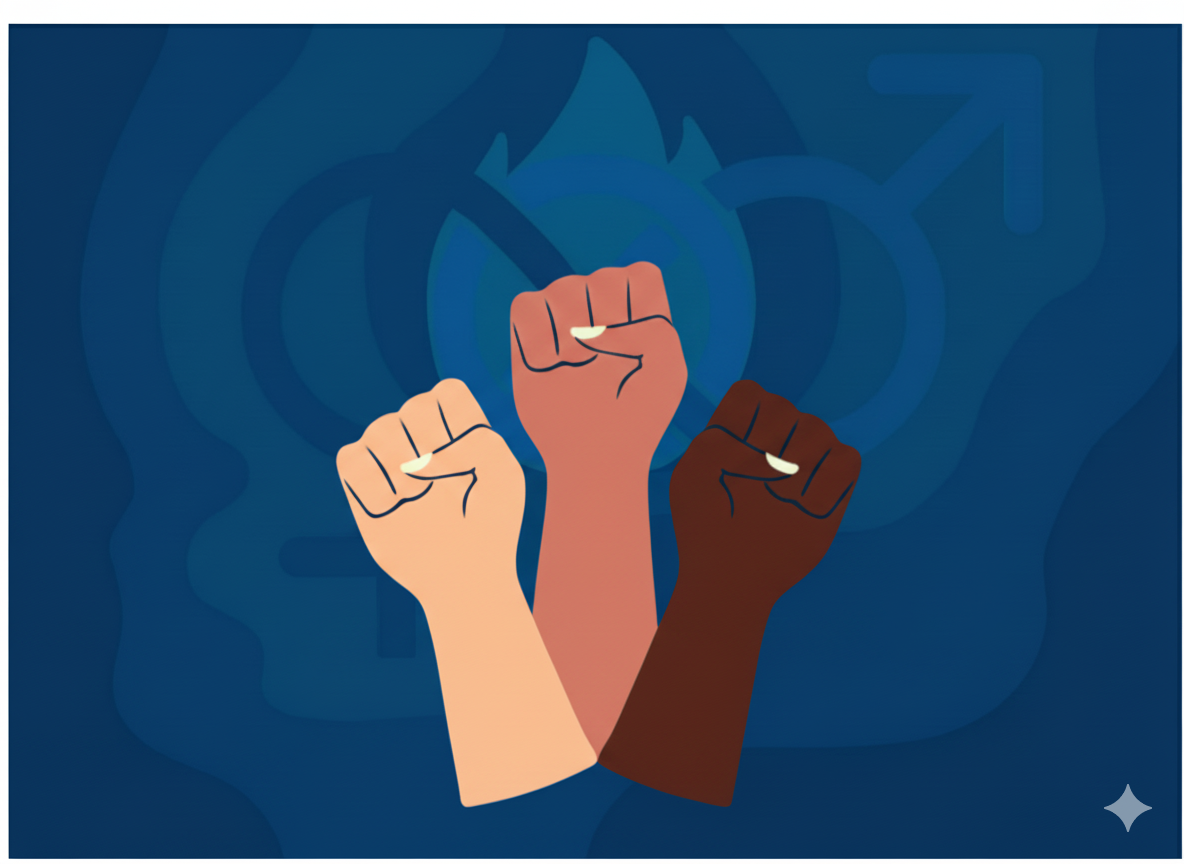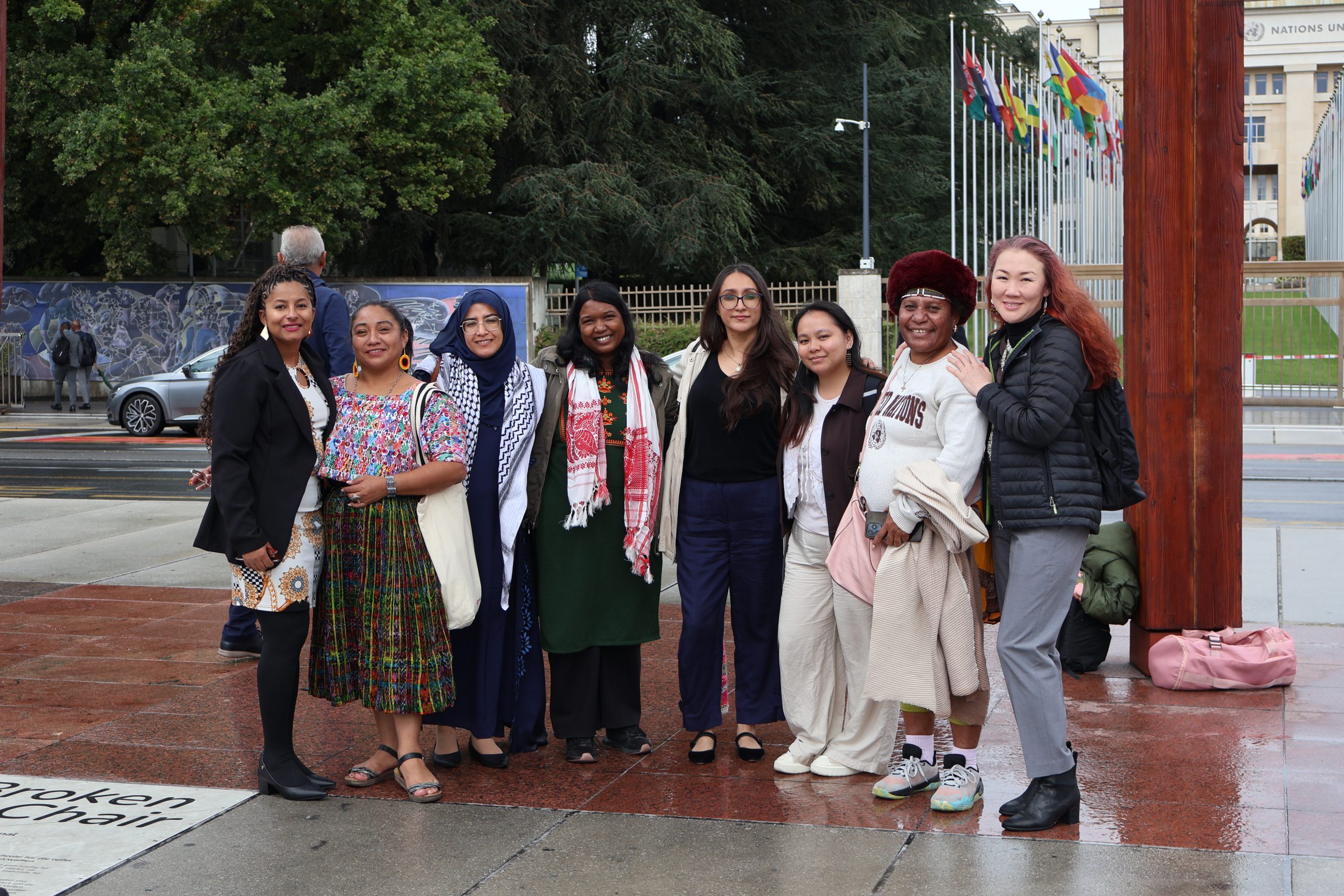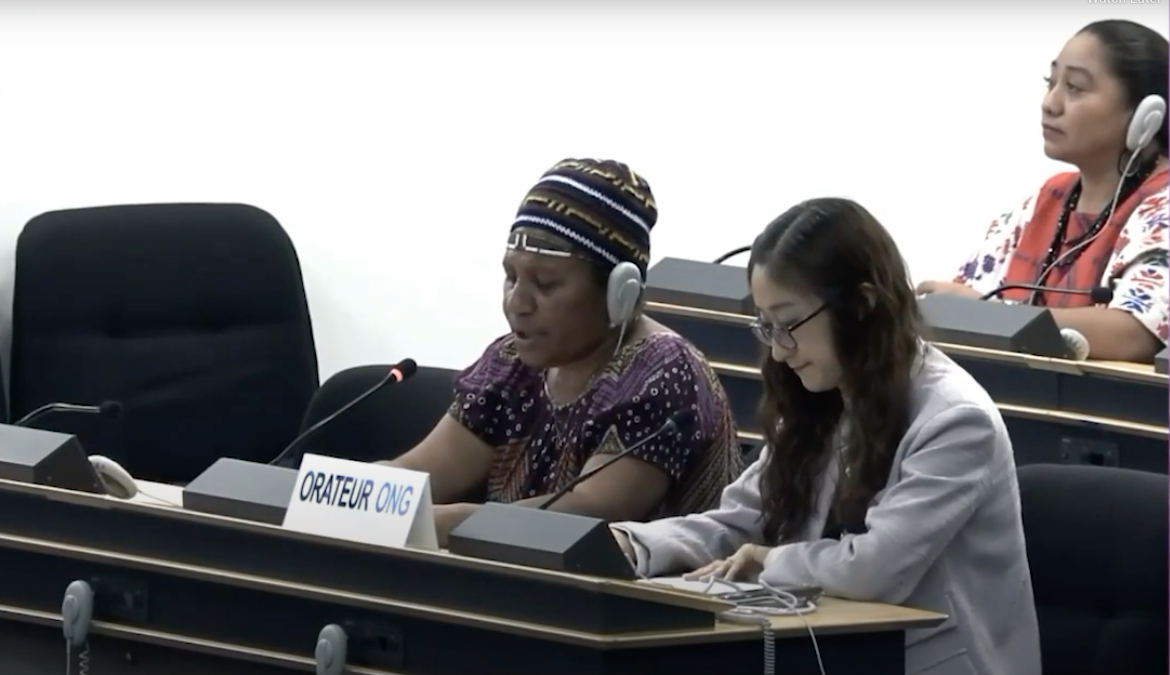Background
The ‘Women Human Rights Defender Advocacy Week’ has taken place for several years to facilitate WHRDs’ in-person access to the UN Human Rights Council (HRC, or ‘the Council’). This year, ten WHRDs attended the 60th session of the Council (HRC60). Regrettably, two WHRDs could not participate due to difficulties in obtaining visas in a prompt and facilitated manner.
WHRDs play a crucial role in promoting and protecting human rights in all dimensions. They face attacks for their vital and legitimate work, based on their gender and the rights they promote, as well as a range of other intersecting grounds of discrimination. They operate in environments marked by conflict, genocide, occupation, displacement, authoritarian practices, militarisation, corporate greed and capture, corruption, and extremism. This is compounded by the global backlash against gender equality, along with intensifying anti-rights rhetoric.
The WHRDs attending HRC60 this year represented diverse Indigenous communities facing marginalisation, violence, and the effects of destructive policies and practices, often linked to extractive industries or the ‘green’ transition. Their work is at the grassroots and community levels, and they often live far from their capital cities. They bear the brunt of old and new forms of colonialism, racism and patriarchy. Documenting their situation and garnering concrete support from the international community is essential for their dignity and survival.
The following is a synopsis of what WHRDs shared about their work, challenges and messages to international human rights mechanisms, broadly addressing the questions raised by the Special Rapporteur’s call for submissions.
WHRDs, their work, motivations and achievements (Question 1)
The motivations shared by the WHRDs are rooted in their lived experience and their communities. Their contexts are discriminatory and violent, and thus their defence of human rights is a deeply felt responsibility, a source of pride and inspiration, but also a heavy burden.
María (Cahabón Resistance, Guatemala), said: ‘Since childhood, I learnt about the importance of access to land and a decent living, but for the past decade extractive companies have invaded our territory without consent, taking our land, rights and livelihoods. We have no choice but to raise our voices against this pillaging and abuse, speak up and seek justice. Little by little, we Indigenous women have lost the fear of speaking in public, even in our native language. This courage motivates me.’
Paula (Brazil), said: ‘My family and I have been badly affected by racism and classism, so I had to educate myself and join movements to understand how the system keeps us in poverty, exclusion and oppression. I use my skills and education to support Black women, social justice groups and those affected by mining disasters. My struggle is for a more just Brazil.’
Aleida, coordinator of the National Network of WHRDs in Mexico, said: ‘My motivation to fight against enforced disappearance began with my own family’s experience. I’m inspired by the solidarity and work of other women in Mexico and regionally. I accompany at-risk or exhausted defenders and journalists using a holistic feminist perspective. Just this week, I gave an oral statement about a missing WHRD and I am convinced that this type of action gives visibility and protection to WHRDs and their families.’
Casselle (Philippines), said: ‘As WHRDs, we are role models in our community. If we show courage, others will, too. We hope the younger generation of defenders will be inspired. Despite the criminalisation and delegitimisation by the central government, in our city we achieved the passage of a Human Rights Defenders Ordinance.’
A WHRD from Palestine said: ‘If we don’t talk about the situation of the Bedouin community, our struggles will remain invisible. Right now it’s difficult to talk about achievements, as Israel is not being held to account. But I can say we managed to stop a draft Israeli bill aimed at expelling Bedouins from our ancestral land.’[1]
A WHRD from India said: ‘As Indigenous women, we have to fight racism, gender discrimination and marginalisation; they exploit and traffic us. So being here to talk about what we and our communities face is an achievement. We are reclaiming our ancestral lands, and in some cases, we succeeded in stopping commercial projects harming local communities.’1
A WHRD from Karakalpakstan said: ‘Seeing the persecution of my community by Uzbekistan – imprisonment, violence, and threats for claiming our rights or speaking the Karakalpak language – motivates me. I have been intimidated and my family threatened, but staying silent means they win. The world needs to know about Karakalpakstan’s Indigenous people’s plight.’
Cressida from Papua New Guinea said: ‘As a woman, I have to stand up for my people and bring our perspective. I have to break through the barriers as women don’t usually have voices at the decision-making table. I have to speak for the voiceless, those who are marginalised and face gross human rights violations by the mining company affecting my community.’
WHRDs: their contexts, restrictions and risks (Question 7)
The multifaceted risks they face range from direct, personal attacks, including against their loved ones and communities (threats, physical and verbal attacks, arrests and criminalisation, surveillance, social pressure), to wider restrictions on civic space, to deeper structural issues such as inequality and discrimination based on their gender and Indigenous identity.
Political stigmatisation, a well-tested playbook in many countries, was a common issue raised. WHRDs are smeared as ‘foreign agents’, ‘enemies of the State’, ‘extremists’ (Russia), ‘urban naxals’, ‘anti-development’, ‘anti-nationals’ (India), ‘communists’ or ‘terrorists’ (Philippines). Sargylana, from Russia, explained she has five administrative and one criminal case against her, and many Indigenous organisations are listed as extremist and terrorist organisations: ‘They say we want to tear the country apart. They marginalise our communities by calling us traitors and enemies.’
This, together with legislation aimed at silencing defenders, has led to many being criminalised and incarcerated. A WHRD from Karakalpakstan said: ‘Many Indigenous activists are imprisoned and die in custody. Defenders living abroad have been sentenced in absentia for speaking up.’ A WHRD from India said: ‘Defenders are imprisoned in dire conditions and some have died there, such as Father Stan Swamy. Since the changes to the penal code and the introduction of UAPA it is easier than ever to arrest defenders without much evidence and without the benefit of bail, as seen in the cases of WHRDs Hidme Markam and Suneeta Pottam’. In Egypt, defenders face a high risk of arbitrary detention if they dare to speak up on certain issues.
WHRDs also face repression by security forces. A WHRD from Palestine described: ‘We are arrested if we talk about the genocide. I am worried about what I might face on my return. In the past, security forces threatened to arrest me, insinuating my human rights work is against the law. Last August, my sister was arbitrarily detained for four days just for an Instagram post that she deleted after two hours.’
Many highlighted the impact of the repression on their families and communities. A WHRD from Karakalpakstan said: ‘I am not afraid for myself, but for my family, who has been threatened after I participated in a public event. My nephew was imprisoned last summer, and my brother lost his business due to persecution by the authorities.’ Sargylana, from Russia, said: ‘The FSB visits my mum once a month, asking about me, so I can’t contact my family.’
A common tactic is to create division and conflict within Indigenous communities. Cressida (Papua New Guinea) has worked amid community conflicts, fanned by the activities of a mining company. A WHRD from Egypt said: ‘Male clan leaders collaborate with the government to enforce discipline and surveillance to keep critical voices under control.’ Casselle (Philippines) noted: ‘Indigenous communities are disproportionately impacted by these tactics as they break down community ties and unity. When this happens, risks increase for everyone.’ Maria (Guatemala) said: ‘We are stigmatised, criminalised and our land rights attacked. The company that violates our rights buys land around us and sends their employees there to intimidate us.’
Censorship, online surveillance and attacks are also a common concern, leading to hyper-vigilance. A WHRD from Karakalpakstan said: ‘We are censored and attacked on social media, our YouTube channel was blocked. Any disagreement with the government means you break the law. People are imprisoned just for liking videos about their native culture.’ A WHRD from Egypt said: ‘They keep hacking our mobiles. I try to keep secure, but you never know if you are being watched.’
All WHRDs reported gender inequality and attacks online and offline. A WHRD from Karakalpakstan said: ‘Many WHRDs I know have faced physical and sexual abuse, turning them into outcasts in their communities. I was attacked online, when my face was photoshopped to the picture of a naked woman doing sexual poses’. Cressida (Papua New Guinea) said: ‘Men dominate decision-making spaces and traditional gender norms mean that when WHRDs speak up, they suffer disproportionate impacts, including physical and sexual attacks. They become excluded and isolated. I was attacked repeatedly. Just the other day, I was attacked with sexual imagery online. I am traumatised by this and from listening to the stories of other women.’
Aleida (Mexico) shared: ‘I faced different attacks in reprisal for my human rights work, including physical attacks and had my belongings and documents stolen. In relation to their work, WHRDs suffer many attacks including lethal violence, gender-based stigmatisation, and even domestic violence. We also see their children affected, including through vicarious trauma. Finally, it is important to highlight that security measures assigned by the State lack a gender perspective in their risk analysis.’
Many WHRDs reflected on the psychological impact and isolation they face due to their work. A WHRD from Egypt said: ‘I was threatened for claiming the rights of Nubian people and was forced to move to Cairo. People are afraid of talking to me because they know I am being monitored’. Some do not know who to trust in their communities and must rely on women’s networks for their well-being and support. Casselle (Philippines) shared: ‘They sow fear so they can do what they want. It is key to consolidate your support community.’ Paula (Brazil) said: ‘We are being spied on, especially online, and there are infiltrators in our groups. Leaders are being targeted, sometimes co-opted. We have to overthink everything we do, the possible consequences, the risks. This can lead to depression and anxiety.’
WHRDs are also facing restrictions on much needed funding. Government funding (from the USA and many other countries in the global North) is being diverted from development, peace, health, and human rights towards areas such as defence and migration control. This affects all WHRDs, but especially those who are forced to rely on foreign funding. Restrictions on foreign funding or anti-money laundering and ‘anti-terror’ legislation are used to target human rights work. This is all long-standing practice in countries like Russia and India, but it is spreading around the world, for example, the Israeli Parliament is debating a bill that would impose an 80% tax on foreign funding for NGOs, silencing those who criticise its policies.
WHRDs and international human rights mechanisms (Questions 9 -11)
Overall, WHRDs have had positive experiences with Special Procedures and appreciated their independence. Aleida (Mexico) said: ‘We have worked well with Special Procedures, especially in urgent cases. They quickly contact us after receiving our alerts. Social media posts prompting authorities to act are usually effective, so they need to do more of this. However, in cases of killings or enforced disappearances, when UN Special Procedures and mechanisms ask to contact families directly, this can be complicated, because they are in shock and then mourning.’
Cressida (Papua New Guinea) reflected that international mechanisms can work, if people have access and are recognised: ‘We are the experts on our own problems, often without realising that we hold the solutions. The UN guidelines and mechanisms are established to guide us, the affected communities, to help drive the process, so we can create the solutions for achieving justice and restoring dignity.’
Maria (Guatemala) appreciated the visits of the Special Rapporteur on Indigenous Peoples’ rights and the Office of the High Commissioner for Human Rights to her community, or her participation in UN Women events, improving the legitimacy of her work, linking the local to the international level. For Paula (Brazil), the UN seems very distant, but the Inter-American Commission on Human Rights has been more relevant for highlighting the situations of WHRDs, to receive protection or reparation measures. A WHRD from India said: ‘UN human rights instruments don’t have an impact in India, and we have little capacity to engage. Our government talks about SDGs, but investment in development projects does not benefit communities.’
Casselle (Philippine) said: ‘Not all Special Procedures are receptive, but we had positive interactions with the Special Rapporteur on human rights defenders. International mechanisms can be effective, depending on how you use them. For example, a joint communication by Special Rapporteurs when colleagues were charged with rebellion increased our legitimacy. We managed to fundraise to pay for bail and the campaign.’ She welcomed that Indigenous Peoples can now register to speak in interactive dialogues without being accredited by an ECOSOC organisation, but information about this should be disseminated widely.
A WHRD from Karakalpakstan said: ‘I worked well with the Working Group on Arbitrary Detention, but the visit of the High Commissioner to Uzbekistan had problems. Only government-organised NGOs (‘GONGOs’) and government officials had access to him, while victims and defenders were blocked, so he did not see the reality. Without full access, such visits are meaningless and risk legitimising authoritarian regimes.’
Sargylana shared her frustration with how governments misuse human rights mechanisms: ‘I am bullied into silence while I have to listen to the Russian representatives in Geneva talking about how they respect and protect the rights of Indigenous Peoples. The world needs to know this is a barefaced lie. Our lands are seen as sources of wealth, and they just want to extract our natural resources without our consent and without sharing the benefits. Colonialism is alive in the 21st century.’
Other WHRDs shared their frustration with the sidelining of Indigenous issues and how marginalisation and racism in their countries are reflected in the discussions at the HRC. Casselle (Philippines) said: ‘They are talking about us without us. Indigenous Peoples and NGOs are on the sides. It is a complicated, expensive, exclusionary system.’ Security risks and reprisals were also highlighted as deterrents for engaging with the UN.
Some of the WHRDs shared that submitting information and keeping up with the relevant procedures and mechanisms requires significant resources, with uncertain outcomes. A WHRD from Palestine said: ‘Engaging with the system costs money, time and resources and keeps us from our core work with communities. Our engagement should be funded and supported.’
Recommendations (Question 12)
All WHRDs called for accountability from States and for a reform of the system, ensuring human rights and defenders are at the centre.
In addition to these calls and concerns, the organisations undersigned would like to reiterate that the UN human rights system needs to be responsive and relevant to the needs of WHRDs. In this regard, States must pay their dues, and participation by WHRDs from grassroots contexts must be safe and accessible, including through funding, prompt facilitation of visas, and remote engagement through hybrid modalities.
The UN human rights system must also:
- reaffirm its commitment to guaranteeing the holistic protection and well-being of WHRDs with a feminist perspective
- recognise, support, and sustain women’s integrity and agency in all their diversity, their work and contributions to social change
- ensure that WHRDs who engage with the UN mechanisms and bodies can do so without fear of persecution or violence and that any allegations or instances of reprisals are promptly investigated
- increase efforts for access to documentation tools, and make those more linguistically representative and accessible.
States must:
- ensure effective follow-up and implementation of UN recommendations and outcomes, through national action plans, centring WHRDs’ voices in all UN bodies and processes.
[1] However, forced evictions and home demolitions are still going on: https://www.amnesty.org/en/latest/news/2024/05/israel-opt-
over-300-palestinian-bedouin-face-forced-evictions-following-mass-home-demolitions-in-negev-naqab/
Raising their voices – Joint Submission to the Special Rapporteur on the Human Rights Defenders – October 2025




